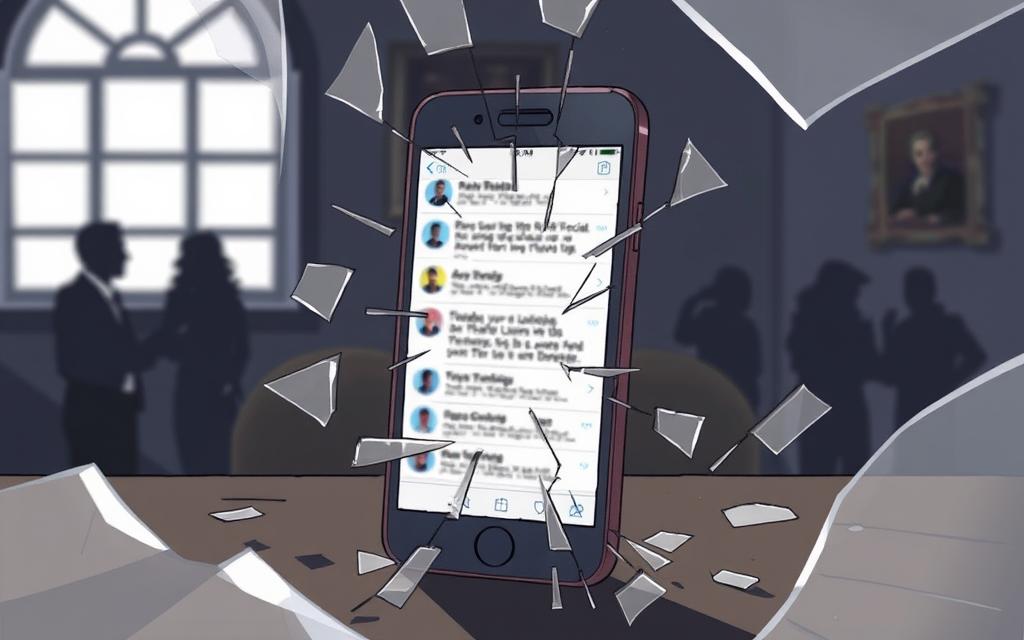Dealing with a serious online scandal is tough for both people and companies. It can be a big public issue or a personal crisis. But, with the right steps, you can bounce back from a bad online scandal. This guide will show you how to handle a crisis, regain trust, and come out stronger.
To recover from a scandal, you need a plan that fixes the problem, tells the truth, and shows you’re working hard to win back trust. By knowing what caused the scandal, getting help from experts, and making a good plan, you can start fixing your online image and getting your credibility back.
If you are ready to get started on your recovery, ask for a free consultation now.
Key Takeaways
- Understand the nature and scope of the online scandal to develop an effective recovery strategy.
- Seek professional guidance from crisis management experts to navigate the complexities of the situation.
- Craft a sincere and authentic public apology that acknowledges the issue and demonstrates genuine remorse.
- Take corrective actions to address the underlying problems and demonstrate a commitment to change.
- Communicate transparently with your audience and stakeholders throughout the recovery process.
Understanding the Nature of a Public Scandal
Public scandals can be many things, like accusations of sexual misconduct or financial wrongdoings. They can also be about drug and alcohol abuse, or insensitive remarks. These public scandals can really hurt a person’s or group’s reputation. They can lead to lost chances, damaged relationships, and even legal trouble. It’s key to know what kind of crisis you’re facing to make a good reputation crisis management plan.
See the various services we offer.
Types of Scandals Public Figures Face
Public figures, like politicians, celebrities, or business leaders, are often under a lot of scrutiny. They might face scandals like:
- Sexual misconduct allegations
- Financial irregularities or fraud
- Drug and alcohol abuse
- Racist, sexist, or otherwise offensive statements
- Abuse of power or authority
Impacts of a Damaged Reputation
When a public figure gets caught up in a scandal, the damage can last a long time. Some effects include:
- Loss of public trust and credibility
- Reduced career opportunities and professional prospects
- Strained personal and professional relationships
- Potential legal issues and financial repercussions
- Ongoing media scrutiny and public shaming
Knowing the nature and effects of a public scandal is the first step. It helps in making a strong reputation crisis management plan. This way, individuals and groups can deal with these challenges and start to recover.

Accept Responsibility and Show Remorse
The first step in recovering from a public scandal is to openly acknowledge the wrongdoing. Take full responsibility for the actions that led to the crisis. Expressing sincere remorse and understanding the harm caused is key. By taking responsibility and showing genuine remorse, public figures can start to rebuild trust and credibility with their audience.
Accepting responsibility can lead to a reduced sentence in federal criminal cases. Most federal criminal defendants who plead guilty get a sentence decrease for showing remorse. For example, “Rust” armorer Hannah Gutierrez-Reed was sentenced to 18 months in prison. She was seen as not showing remorse, as shown in recorded jail calls.
In Victoria, Australia, showing remorse can help in sentencing. It might lead to a reduced sentence or other favorable outcomes. Writing a remorse letter can improve chances of a favorable outcome in Melbourne, Victoria. Remorse letters are important in legal cases, showing acknowledgment of wrongdoing and responsibility for actions.
Demonstrating genuine remorse can repair relationships and provide closure. It can also deter future wrongdoing. By taking responsibility and expressing remorse, public figures can start to rebuild trust and credibility.

“Remorse letters play a crucial role in legal cases, especially those involving criminal offenses, by showing acknowledgment of wrongdoing and responsibility for actions.”
Seek Professional Guidance
Handling a public scandal needs the help of experts in crisis management and reputation recovery. As a public figure, it’s key to have a crisis management team with legal and PR experts. They offer crucial professional guidance for scandal recovery. They help you with the right response, talking to the public, and fixing the crisis to protect your reputation.
Assemble a Crisis Management Team
Your crisis management team should have these important members:
- Legal Counsel – Experienced lawyers who give legal support in reputation management. They advise on legal issues and make sure you follow the law.
- Public Relations Specialists – PR experts who create a plan for talking to the public. They handle media and tell your story in a clear way.
- Reputation Management Experts – They watch your online presence. They help remove bad content and build a good online image.
- Crisis Communications Consultants – They help with crisis communication. They train you for media and manage how the public reacts.
By getting professional help for scandal recovery, you can handle the complex process of reputation management. A dedicated team of experts can guide you through the crisis and help you recover successfully.

Determine an Appropriate Response Strategy
After getting advice from experts, the next step is to create a good response plan. You need to look at how bad the scandal is, how it might affect your reputation, and the best way to fix it. Your plan should show you care, address public worries, and help you get back on track.
When making a plan for a scandal, focus on crisis communication planning and effective crisis management tactics. This means:
- Understanding the crisis and its effects
- Building a team with experts inside and outside your company
- Creating a clear, honest message for stakeholders
- Watching online for bad comments and fixing them fast
- Reviewing how you handled the crisis and making changes
By making a plan that focuses on good communication and management, you can handle the crisis better. This sets you up for a strong recovery.
“Effective crisis management is about being prepared, acting quickly, and communicating transparently. It’s not just about putting out fires, but about building resilience and trust.”
Remember, fixing a serious online scandal needs a plan that includes quick action, long-term thinking, and a strong commitment to rebuilding your reputation. By being proactive and using the right strategies, you can come out of this challenge even stronger.

Issue a Sincere Public Apology
When a public scandal hits, a sincere apology is key to fixing your reputation. The apology must own up to the mistake, show real regret, and promise to fix it. This shows you’re serious about making things right and earning back trust.
Apologizing well can really help in rebuilding trust through apologies. Look at Facebook and Wells Fargo, who lost customer trust after scandals. They made ads to say sorry, admit fault, and explain how they’ll fix it.
But, people were still unsure, with mixed reactions to their apologies. Facebook’s got lots of dislikes, and Wells Fargo’s got a lot of dislikes too. This shows how important it is to mean it and follow up with real actions.
Volkswagen learned a big lesson from its own scandal. They paid nearly $14.7 billion and offered better warranties. Issuing a public apology for a scandal is just the start. Following through on the apology is what really matters for trust and forgiveness.
An apology, when genuine and followed by meaningful actions, can significantly impact a company’s reputation and future success.
By owning up, showing remorse, and promising to fix it, you start fixing your reputation. This is the first step in effective crisis communication and getting back the trust you lost.

Take Corrective Actions
After a sincere public apology, public figures must take real steps to fix the problems. They need to seek help for personal issues, make amends, and prevent future scandals. This shows they are truly committed to change.
Seek Counseling or Treatment
If the scandal is due to personal problems like addiction or mental health, getting help is key. Counseling or treatment helps the person grow and become healthier. This can help them win back the public’s trust.
Make Amends
After apologizing, making direct actions to fix the harm is vital. This can be financial help, partnering with organizations, or volunteering. Corrective actions after a scandal can include compensating affected parties, partnering with relevant organizations, or volunteering time to community initiatives.
By taking these steps, public figures can start to rebuild their reputation. Seeking professional help for personal issues and making amends to affected parties are crucial elements of this journey towards redemption and restoration.
“It takes 20 years to build a reputation and five minutes to ruin it. If you think about that, you’ll do things differently.”
– Warren Buffett
Communicate Transparently
When a public scandal hits, it’s key to keep communication open and clear. As a public figure, you must regularly update everyone, answer questions directly, and listen to feedback. This way, you can start to rebuild trust and show you’re serious about fixing things.
Good crisis communication means being upfront, honest, and easy to reach. By sharing news quickly and facing problems head-on, you show you care about being open and accountable. This helps control the story and shows you want to regain trust through honest talks.
Being open in your communication is vital for recovering from a scandal. When you’re clear about what you’re doing to fix the problem and take responsibility, people see you’re serious about making things right. This openness can be a strong tool in overcoming a scandal and improving your reputation.
| Company | Scandal | Communication Approach | Outcome |
|---|---|---|---|
| Johnson & Johnson | Tylenol Poisoning Crisis (1982) | Recalled 31 million bottles, implemented tamper-proof packaging, and launched a robust PR campaign | Regained trust and market share by demonstrating transparency and accountability |
| Wells Fargo | Fraudulent Account Openings (2016) | Fired employees, investigated root causes, and reimbursed affected customers | Began rebuilding reputation through direct communication and corrective actions |
| Volkswagen | Emissions Scandal (2015) | Acknowledged wrongdoing, implemented transparent communication, and focused on making amends | Gradually regained trust by addressing the issue and committing to ethical practices |
These examples show how important clear communication is during a scandal. By owning up to mistakes, keeping people informed, and showing you’re committed to fixing things, companies can get through tough times and win back trust.
“Transparency is the new currency. Authenticity is the new marketing.”
Rebuild Trust Through Consistent Efforts
Rebuilding trust after a scandal is a long journey. It needs consistent efforts and a real commitment to positive change. By showing a strong reputation management strategy, you can win back respect and confidence.
Starting positive initiatives, like helping others or joining community events, is a good start. It shows you care and are trustworthy. It also changes how people see your brand or image.
Being open and honest is crucial in rebuilding trust. Quick, customer-focused actions during tough times help a lot. For example, KFC used humor and openness in 2018 to keep customers loyal during a chicken shortage.
It’s important to keep working on trust and show you’re willing to change. This long-term effort, along with reputation management strategies, can help you regain your audience’s trust.
| Company | Crisis Faced | Reputation Recovery Strategies |
|---|---|---|
| United Airlines | Passenger forcibly removed from overbooked flight in 2017 | Proactive communication, transparency, and customer-centric solutions |
| Volkswagen | Admission to emissions test cheating in 2015 | Transparency, acknowledgment of wrongdoing, and long-term commitment to change |
| Starbucks | Racial bias incident in 2018 | Closure of stores for employee training, demonstrating a commitment to inclusivity |
“Transparency and sincerity in communication are key elements in rebuilding trust after a scandal.”
By using consistent efforts to rebuild trust, long-term reputation management strategies, and demonstrating a commitment to change, you can overcome the tough road to reputation recovery. You can win back the trust of your stakeholders.
scandal recovery
Getting over a public scandal is tough. It needs patience, hard work, and a strong will to fix things. As someone in the public eye, you’ll face tough times and lots of attention. But, you must keep working hard to fix your reputation.
A study by Red Banyan shows that saying sorry sincerely can boost trust by up to 25%. This shows how important it is to own up and show real regret. It’s a key step in starting to get better.
Another study found that focusing on customer service after a scandal can speed up recovery by 30%. By always trying to do better and caring for your stakeholders, you can win back their trust.
Finally, beating crisis management and fixing your reputation takes a lot of patience and perseverance. As a public person, you need to handle the tough times, learn from mistakes, and keep moving forward. Even when things get hard.
“The only way to do great work is to love what you do. If you haven’t found it yet, keep looking. Don’t settle.” – Steve Jobs
By staying strong and focused, you can come out of a scandal with a stronger reputation. This reputation will inspire trust and confidence from your stakeholders.
Monitor Online Presence and Sentiment
In today’s world, keeping an eye on your online reputation is key. As a public figure, you need to watch for any bad or wrong info online. You should then act to fix or hide it.
This might mean reporting false stuff, using special online strategies, and sharing good news. This helps balance out the bad news from the scandal.
Dealing with negative online content is vital for keeping your brand’s trust. Use tools like Google Alerts and Mention to know what people are saying about you. When you see something bad, quickly respond with empathy and a plan to fix it.
Being quick and open in a crisis helps protect your reputation. Give clear updates, be honest about what you’re doing, and choose the right people to talk for you. By watching your online presence and feelings, you can change the story and start fixing your reputation.
| Metric | Importance | Insights |
|---|---|---|
| Sentiment Analysis | Shows how your brand is doing over time | Tracks good, bad, and neutral mentions to see overall feelings |
| Demographics Data | Helps you know who’s talking about you and adjust your messages | Looks at the age, gender, and place of mentions |
| Conversation Drivers | Helps you understand what’s hot and what’s not | Finds out what’s making people talk about you to help plan your content |
| Engagement Metrics | Tells you how well your content is doing | Looks at likes, shares, and comments to see how people are interacting with you |
| Share of Voice | Shows how visible you are compared to others | Compares your visibility to your competitors |
Using these insights, you can make smart choices, change your communication plans, and actively work on managing your digital presence during a scandal and rebuilding your online reputation.
“Reputation is the cornerstone of power. Through reputation alone, you can intimidate and win; once it slips, however, you are vulnerable, and will be attacked on all sides.”
Engage in Positive Initiatives
To rebuild trust after a scandal, public figures must take action. They should focus on positive initiatives that show they care about society and community. By doing good work, they can change how people see them and show they’re sorry.
Philanthropic and Community Engagement
Helping others through philanthropy is a great way to show you’re committed to good. Pick causes that match your values, like education, the environment, or health. Working with local groups, volunteering, or helping at events can also help you regain trust.
| Positive Initiative | Benefits | Examples |
|---|---|---|
| Philanthropic Efforts |
|
|
| Community Involvement |
|
|
By getting involved in good causes, public figures can show they’re serious about helping others. This helps them recover their reputation and shows they’re committed to making a difference.
Learn from the Experience
Recovering from a public scandal is a chance for personal growth. It lets public figures learn from their mistakes and grow. They can come out with a new purpose and a deeper understanding of ethics.
The Volkswagen emissions scandal made the company reflect and change. They apologized, offered compensation, and started making electric vehicles. This showed their commitment to fixing trust with customers and shareholders.
The Tylenol poisoning scandal in 1982 led Johnson & Johnson to create tamper-proof packaging. This move increased trust and loyalty from consumers. These stories show how scandals can lead to positive changes.
By learning from scandals, public figures can recover and transform. This self-reflection and improvement make them stronger and more resilient. It’s a chance to grow and change for the better.
“Acknowledging responsibility and apologizing sincerely can help in healing and rebuilding trust with the public after a scandal, as insincere apologies can further damage one’s reputation.”
The journey to recovery is tough, but it’s worth it. Learning from scandals shows a commitment to ethics and growth. This not only rebuilds trust but also proves resilience and integrity.
| Case Study | Lessons Learned | Preventative Measures |
|---|---|---|
| Volkswagen Emissions Scandal | Assess damage, apologize sincerely, offer compensation, invest in sustainable solutions | Implement robust quality control, enhance transparency, prioritize environmental responsibility |
| Tylenol Poisoning Scandal | Prioritize consumer safety, implement tamper-proof packaging | Enhance product safety protocols, maintain vigilant quality assurance |
| Ratner Group Scandal | Acknowledge mistakes, rebrand and rebuild reputation | Foster a culture of ethical conduct, provide leadership training |
By learning from scandals, public figures can become stronger and more ethical. The journey to redemption is tough, but it’s worth it for personal growth and development.
Case Studies: Public Figures Who Recovered
Many famous people have bounced back from public scandals. They show us how to recover and rebuild our reputation. With the right steps, even big scandals can be overcome.
Tiger Woods
In 2009, Tiger Woods faced a big scandal about his affairs. He took responsibility, got help, and worked on himself. He won back his fans and sponsors, and is now a top golfer again.
Martha Stewart
Martha Stewart was convicted of insider trading in 2004. She owned up to it, served her time, and worked hard to rebuild. Her hard work and dedication helped her regain her status as a respected leader.
Robert Downey Jr.
Robert Downey Jr. fought back from addiction and legal problems. After prison and rehab, he made a big comeback. He starred in Iron Man and became a Marvel hero. His story shows the power of redemption.
These examples show that even after big scandals, people can recover. They prove that with the right steps, anyone can rebuild their reputation.
Conclusion
Recovering from a public scandal is tough but key for public figures and groups. By understanding the crisis, taking blame, and getting expert help, you can start to rebuild trust. This leads to a stronger reputation than before.
The path to reputation recovery is long but worth it. It opens doors to new chances, stronger relationships, and a fresh sense of purpose. Remember, “the true test of character is not how you handle success, but how you respond to adversity.” With a solid plan, you can come out stronger and ready for the future.
Reputation management is vital today. With fast-spreading info and opinions, keeping a good image is essential. By tackling scandals and using smart recovery plans, you can lessen the harm and set yourself up for success.
FAQ
What are the common types of public scandals that public figures and businesses face?
How can public figures and businesses take responsibility and show remorse for a scandal?
Why is it important to seek professional guidance when navigating a public scandal?
How can public figures and businesses effectively communicate with the public during a scandal?
What are some effective strategies for rebuilding trust and credibility after a scandal?
What are some examples of public figures who have successfully recovered from a scandal?
Do you have questions about selecting the best ORM option? Get a free consultation now.

